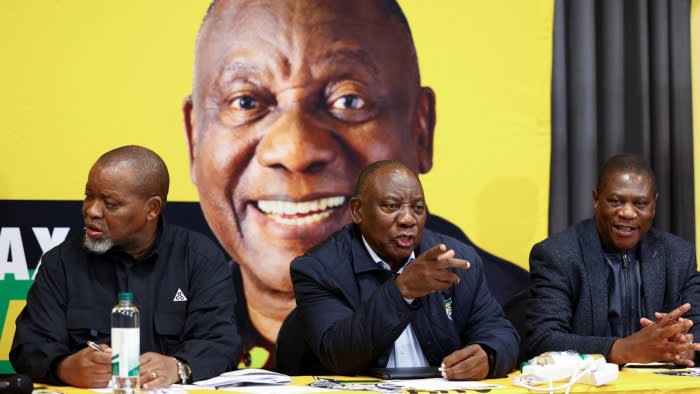Unlock the Editor’s Digest for free
Roula Khalaf, Editor of the FT, selects her favourite stories in this weekly newsletter.
South Africa’s ruling African National Congress and the opposition Democratic Alliance are nearing a deal on a power-sharing agreement that would allow parliament to re-elect Cyril Ramaphosa as president.
The rand strengthened on Thursday as talks progressed. Conclusion of a deal could see Ramaphosa sworn in for his second full term by lawmakers on Friday.
Under the pact, which still needs to be approved by the ANC’s union affiliates and National Executive Committee, its main decision-making body, the pro-market DA could secure several cabinet positions in a coalition that would also involve the Zulu-dominated Inkatha Freedom party (IFP).
“It is very close, but nothing has been signed yet,” said one person close to the negotiations. “Nearly all the hurdles have been cleared.”
On Wednesday, IFP leader Velenkosini Hlabisa said his party would join an ANC-DA coalition. Inkatha’s involvement would help it appeal to Zulu voters who deserted the ANC for former president Jacob Zuma’s uMkhonto weSizwe (MK) party.
While Ramaphosa has dubbed the potential arrangement as a “government of national unity” to help convince ANC leftwingers resistant to a deal with the DA, neither MK nor the radical Economic Freedom Fighters, led by Julius Malema, appear likely to be part of any coalition.
“The rand has been rallying now on the assumption that the EFF are pulling out,” said Jason Swartz, a fund manager at financial services company Old Mutual Investment Group. “Talk of a DA involvement in the government has led to a pop in the currency.”
The currency, which fell as low as R18.92 against the dollar when the prospect of a coalition with the EFF and MK Party seemed possible, on Thursday rose 0.2 per cent to about R18.40.
Frans Cronje, a political analyst, said the DA had ended up pushing for a full-blown coalition as the price of its support for Ramaphosa, whose party scored a historic low of 40 per cent in last month’s election.
Cronje said a peaceful transition to a coalition would be a significant achievement for South Africa’s democracy, avoiding both a market-upending shift leftward or the violence threatened by Zuma, who disputes the election result.
“Look where we are and where we aren’t,” Cronje said. “We aren’t at a radical populist collapse and we don’t have shooting in the streets.”
Parliament will convene on Friday to elect a new president, speaker and MPs in the absence of an ANC majority for the first time in 30 years.
The ANC’s national executive is due to meet later on Thursday to approve the plan. On Wednesday, the party met its alliance partners, labour federation Cosatu and the South African Communist party (SACP), to present its proposals.
While SACP secretary-general Solly Mapaila has previously spoken of “rejecting” a coalition with either the DA and MK, Cosatu appeared more open to a deal.
“The DA will always be a tough sell,” Cosatu’s spokesperson Matthew Parks told the FT, referring to the liberal economic agenda of the DA, which is led by John Steenhuisen and has traditionally been the party of white and other minority voters. But he said Cosatu understood “the ANC’s logic, given the challenges we’re facing as a country and [given] that it didn’t win a majority”.
Recommended
Cosatu has insisted on respect for South Africa’s labour laws, including the minimum wage. People close to the DA said it was prepared to drop its opposition to the salary rule.
“The DA is very rapidly shifting into a realistic centre ground,” said Cronje.
The Constitutional Court late on Wednesday rejected an application from Zuma’s MK, which won 14.5 per cent of the vote, to interdict parliament’s first meeting, a move that would help scupper approval of a coalition pact.
In court papers, MK secretary-general Sihle Ngubane said it had “a large and growing body of evidence” to back up its claims of vote rigging, an allegation most neutral observers regard as baseless.
The party is nonetheless expected to boycott lawmakers’ first sitting on Friday, in a last-ditch effort to prevent parliament proceeding on the grounds that it would not be “properly constituted” — an argument which analysts said was based on an incorrect interpretation of the law.
Source link : https://www.ft.com/content/576d733d-690a-4d14-b6fd-7b8db927beb7
Author :
Publish date : 2024-06-13 11:05:37
Copyright for syndicated content belongs to the linked Source.
